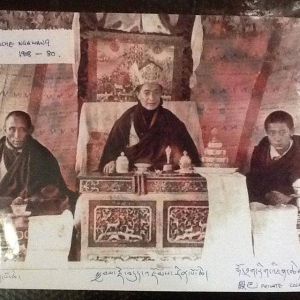On the Three Statements of Garab Dorje
On the Three Statements of Garab Dorje
Preface to Dudjom Rinpoche's Short Commentary
Born 166 years after the Parinirvana of Lord Buddha in Oddiyana northwest of India, Garab Dorje an emanation of Vajrasattva, was the first human teacher of the Atiyoga Tantras (Dzogchen or Great Perfection) in its current cycle. From the age of seven, he defeated the pandits of Oddiyana and India with his teaching that Dzogchen and it's state of Rigpa (enlightenment or self-originated intrinsic Awareness) goes beyond the law of karma and the law of cause and effect. At his passing into the 'Body of Light', he gave his disciple Manjushrimitra what have become known as the Three Statements or Three Testaments. [1]
In his book The Crystal and the Way of Light, Chogyal Namkhai Norbu Rinpoche renders them as follows:
1. DIRECT INTRODUCTION to the primordial state is transmitted straight away by the master to the disciple. The master always remains in the primordial state, and the presence of the state communicates itself to the disciple in whatever situation or activity they may share.
2. The DISCIPLE enters into non-dual contemplation and, experiencing the primordial state, NO LONGER REMAINS IN ANY DOUBT as to what it is.
3. THE DISCIPLE CONTINUES IN THE STATE of non-dual contemplation, the primordial state, bringing contemplation into every action, until that which is every individual’s true condition from the beginning (the Dharmakaya), but which remains obscured by dualistic vision, is made real, or realized. One continues right up to Total Realization.
Dudjom Rinpoche writes:
A Short Commentary on the Three Statements of Garab Dorje by Dudjom Rinpoche
I. As for the direct introduction to one's own nature: This fresh immediate awareness of the present moment, transcending all thoughts related to the three times, is itself that primordial awareness or Knowledge (ye-shes) that is self-originated intrinsic Awareness (Rig-pa). This is the direct introduction to one's own nature.
II. As for deciding definitively upon this unique state: Whatever phenomena of Samsara and Nirvana may manifest, all of them represent the play of the creative energy or potentiality of one's own immediate intrinsic Awareness (Rig-pa'i rtsal). Since there is nothing that goes beyond just this, one should continue in the state of this singular and unique Awareness. Therefore, one must definitively decide upon this unique state for oneself and know that there exists nothing other than this.
III. As for directly continuing with confidence in liberation: Whatever gross or subtle thoughts may arise, by merely recognizing their nature, they arise and (self-) liberate simultaneously in the vast expanse of the Dharmakaya, where Emptiness and Awareness (are inseparable). Therefore, one should continue directly with confidence in their liberation.
That is pure Dzogchen Atiyoga. A Dzogchen Master STARTS with "direct introduction" with everyone. If they don't "get it" then one starts to use all the infinite methods and means to help bring about the experience of Rigpa. When one has the experience of Rigpa, then one confirms the validity of one's path now being "remaining with Rigpa" as path. Then, one simply continues in that state. Rigpa is the view to be experienced, Rigpa is the path to be followed, and Rigpa is the fruit of the path. There is no change in Rigpa, either in the beginning, middle or end. The fruit is your first realization of Rigpa. There are no Stages of Rigpa. Thogel does not modify Rigpa.
[1] These three Statements succinctly sum up the essential points of the Dzogchen teachings.
They are:
1. DIRECT INTRODUCTION to one's own primordially pure nature]] by a lineage Dzogchen master (ngo rang thog-tu sprad-pa);
2. DOUBTLESSLY and directly discovering this unique state (thag gcig thog-tu bcad-pa);
3. CONTINUING directly with confidence in this growing state of (self-)liberation of all (gdeng grol thog-tu bca'-ba).
Source
[[1]]
